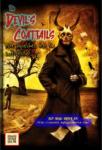The Devil’s Coattails: More Dispatches from the Dark Frontier
Jason V. Brock and William F. Nolan, Editors
Cycatrix Press
Hardcover, 294 pages, $49.95; $194.95 for the deluxe edition
Review by Sheila M. Merritt
It is extremely difficult to write a review of an expensive book based on a spartan uncorrected proof. The Devil’s Coattails retails at $49.95 in its limited to 500 copies trade hardcover edition. For those who want to splurge even more, there’s the deluxe printing: limited to 52 signed and lettered copies at a whopping $195.95. Is the cost justified? Based on the no-frills, spiral bound reviewer’s version, what can be said is that the stories contained in the volume are generally very worthwhile. And the black and white illustrations (which according to the notes in the table of contents, are only available in the deluxe edition; there is no statement regarding if they are reprinted in color) are striking. Masterpieces of horror by Goya and Munch, along with less familiar artists’ works, are exhibited. As with the artwork, the writers represented in the tome range from the eminent to the not as well known. This makes for a well-balanced compendium, a variety of creative voices diverting in their diversity.
Writer Oscar Wilde and painter Frank Miles are employed as characters in “The Hidden Realm” by W.H. Pugmire and Maryanne K. Snyder. The 19th Century historical figures were indeed comrades in real life. The relationship between the talented twosome was possibly, given Wilde’s well known proclivities, sexual. There are allusions in the narrative that hint at this, with Miles being tormented by visions that both repulse and attract him; in reality, he did go insane. In this work of fiction, Frank is confronted by perceptions and realities that demand interpretation: “Particles of darkness wheeled around him, like dust that danced with dust – and then the particles formed into faces that that laughed and sneered. He snatched at one of the cruel visages and caught it in his hand, and he felt it crumple like a dry dead leaf in his grasp. Something kissed his face, and a pair of silver eyes gazed into his own. The face to which the eyes belonged was no longer beautiful – it was bestial, horrible; it overflowed with menace and madness. Frank pushed away and swam through shadow, until he came at last to a place of sanitary light.”
Love, parenthetically homosexual, is also addressed in “If You Love Me” by Paul G. Bens. The protagonist of the story is pushed to the extreme in proving his passion/devotion to his lover. This tale cuts deep into co-dependency. A disturbing and probing look at the dark side of commitment, the yarn looks at the lethal power of love and loyalty abused.
An alliance gone awry is also examined in Melanie Tem’s “Best Friends.” Tem’s first person narrator asks a profound question: “Why aren’t there more love songs and poems about best friends? They’re who can really break your heart.” She goes on to elucidate, that even after years of contented matrimony, it is a friendship that haunts: “From a long, rich, good marriage I can’t summon a single thought of him. Michelle, though, is shimmering in the archway between the living room and dining room, opaque and multidimensional as betrayal.” The contrast between an easy alliance with a spouse, and the mercurial demands of a friend are beautifully rendered in this tale. The author reminds that what is facile is often forgettable; we tend to remember the drama – and the emotion.
In Earl Hamner’s “The Woods Colt,” uneasy interactions and unfulfilled affinities again come into play. A son returns to his former home, and gazes at his deceased parents’ house, which he has sold: “The once gracious Victorian mansion now had a haunted look. Ancient ivy plants that had been carefully trimmed when he was a boy now clung in thick gnarly trunks to the shingled walls forming a dense, green covering. One of the upstairs windows had been broken. Behind it, a lace curtain moved fretfully in the wind.”
The denouement of Hamner’s piece allows for the dreaded word, “closure.” This is not the case in R.C. Matheson’s humorous and, acutely short, short story “Interrogation.” In this yarn, an eyewitness to a brutal, violent crime is questioned. Remaining silent through the query session, the non-responsive observer frustrates the inquisitors. Clever and cagey, Matheson plays and has fun in the process.
The Devil’s Coattails includes works by horror favorites such as: Ramsey Campbell, John Shirley, William F. Nolan, Gary A. Braunbeck, Nancy Kirkpatrick, Steve Rasnic Tem, and the late Dan O’ Bannon. In general, the 21 contributions contain a photo and information about each author, as well as the writers’ musings about the genesis of their pieces. As to the price of the volume: It is steep, and the deluxe edition is obviously geared to collectors. Is the book recommended reading? Yes, but the expense limits the readers to an exclusive bunch of bibliophiles.









